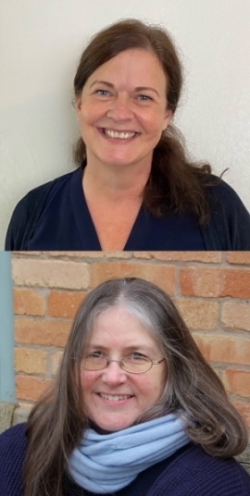19 July 2023
An exciting new nurse-led study aims to test the use of artificial intelligence (AI) in surgical wound management to help prioritise and highlight wounds which need urgent review or treatment.
Led jointly by Melissa Rochon, lead for surgical site infections surveillance, research & innovation at Royal Brompton and Harefield hospitals, and Professor Judith Tanner from the University of Nottingham, the project known as WISDOM aims to develop a specific AI module which will prioritise surgical wound images that are failing to heal or are infected, in order to facilitate early treatment.
Surgical wounds
A surgical wound is the cut made into the skin by a surgeon during an operation. At the end of the
operation, the skin is stitched back together to allow the skin edges to come together and heal.
Most surgical wounds heal without causing any problems or complications. However, in some cases the wound may become infected, which can result in wound healing delays, hospital re-admission or further surgery.
Each year approximately 2.1 million surgical patients in England have wound healing problems after surgery, of which 500,000 become infected. Most of these wound complications happen after patients have been discharged from hospital.
What is remote wound monitoring?
This is a new digital service where patients are asked to send photos of their surgical wound at scheduled times, or whenever they have a concern. The images are reviewed by a clinician, which ensures that any emerging problems and concerns are identified quickly.
However, this service creates a new and ongoing workload for clinicians who need to review wound images as close as possible to the time they are submitted by patients.
This new research project aims to help clinicians manage this new workload quickly and efficiently by using AI to prioritise images, so that more serious issues are looked at first.
Can AI be used to help prioritise images?
That’s the question the research team hope to determine.
The research team have already helped to develop a wound monitoring platform, called Isla, which was the first of its kind to use AI to help improve image quality. The platform is already in use at seven cardiac centres across England.
For this new project, the research team hope to build on this platform by developing a new module which will use AI to prioritise and highlight those wounds which need urgent review or treatment by a clinician. This will ultimately allow treatment to start as soon as possible.
Melissa explained how the study will be conducted.
“The feasibility study will take place in two cardiac hospitals with 120 patients randomised to have either standard patient wound follow-up after surgery or standard follow up plus Isla. The data we collect will inform the design of a larger trial and we’ll also collect data on patient and staff acceptability, wound complications, and cost savings such as staff time, and clinic and GP visits.”
The project will be conducted in collaboration with Professor Judith Tanner, professor of adult nursing at the University of Nottingham.
Professor Tanner explained the potential benefits of this research for other types of surgery.
She said: “While we are carrying out this trial with patients who have had cardiac surgery, Isla has been designed to be transferrable to other kinds of surgery. In fact, it is already used after caesarean section.
“The AI component will reduce staff workload and allow Isla to be used more widely, potentially on all the 10 million patients who have surgery in England each year.”
Funding for the project was awarded by the National Institute for Health Research (NIHR) through its Invention for Innovation (i4i) programme which supports the development of medical technologies in areas of existing or emerging patient need.
To find out more about our research, please contact us.
Read more of our research stories or sign up to our research newsletter.
